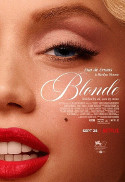
Directed by
Andrew Dominik
166 minutes
Rated R
Reviewed by
Bernard Hemingway


Blonde
Coming hard on the heels of Baz Luhrmann’s Elvis Andrew Dominik’s Blonde is a fictionalised account of another iconic 20th century show biz tragedy. In both style and content the two films are the very antithesis of each other. Whereas Lurhmann’s razzle’em, dazzle’em spectacular paid homage to The King of Rock’n’Roll, Dominik, who also wrote the film’s screenplay, based on the novel of the same name by Joyce Carol Oates, takes us into the depths of the imagined dark world of Norma Jeane Mortensen, the star-struck young woman who was fashioned by Hollywood into the breathy, pouting sex goddess, Marilyn Monroe.
Dominik’s film has been roundly dumped on Stateside as a grubby and luridly exploitative film that uses Marilyn as much as the studios did during her short career. Whilst it is easy enough to see how one could argue this interpretation, indeed it is almost impossible to avoid it, the accusations seem to me more fueled by outrage at a perceived attack on a cherished idol than any reasoned consideration. The NC-17 censorship rating that it has been slapped with in the US might be taken as confirmation of this suspicion.
I haven’t read Oates novel so it is impossible to say how true Dominik’s screenplay is to that text but I gather beyond eliminating sections of it, it is largely so (and apparently Oates has approved Dominik’s film). In this respect neither book nor film delivers a conventional biopic with its recreation of familiar people, places and events designed to valorise its subject. Rather, it is the story of a warped childhood (Norma Jeane), troubled adulthood (Marilyn) and the making of a myth (The Blonde) and how the creation of the latter depended on the destruction of the first, then the second incarnation of it.
Not to mince words, Dominik is brutal in his account of Marilyn’s apotheosis as a sex goddess, most emblematically depicted by Billy Wilder in the famous scene in The Seven Year Itch (1955) in which Marilyn stands on a subway grate to allow her ivory white dress billow upwards to reveal her matching underwear, the perfect image of virginal purity and sexual desirability.
But why should he not be? As a child (played with poignancy by Lily Fisher) Norma Jeane’s head is filled with unrealized promises by her mentally unstable mother (Julianne Nicholson) who eventually tries to drown her in her bath; she is raped by a studio exec only named Mr Z. but apparently a reference to Darryl F. Zanuck (Harvey Weinstein anyone? ); undergoes a traumatic pregnancy termination (the representation of which has attracted a storm of disapproval for being unnecessarily graphic and anatomically incorrect); is subjected to physical abuse during her short-lived marriage to Joe DiMaggio (Bobby Cannavale), and, perhaps most repugnantly of all while doped up on booze and pills she is forced to fellate President Kennedy (Bill Clinton anyone?). None of this deserves to be handled with kid gloves and one can only assume that Dominik’s intention was to confront his audience with the bitter truth. If so he has been successful beyond his wildest dreams.
The extent of the re-imagining of Marilyn, places a heavy load on Cuban actress Ana de Armas in a role that was at one time to go to Naomi Watts then Jessica Chastain. She carries it convincingly even if, understandably she is more effective as the iconic Marilyn well known from films such as Gentlemen Prefer Blondes (1953), and Some Like It Hot (1959) than the adult Norma Jeane. Yet uffice it to say that we feel the latter’s pain as well as her relatively rare moments of happiness. On this point I was a little mystified by the portrayal of a three-way romance between Marilyn, Charlie Chaplin Jr. (Xavier Samuel) and Edward G. Robinson Jr. (Evan Williams). Although it does allow for some lighter moments, as far as I know it is a complete fabrication and especially given the film’s unnecessarily long run time could have well, perhaps indeed should have, been excised. On the other hand Adrien Brody is marvellous as Arthur Miller who at least for a while, albeit too little too late, brought Marilyn some relief from her demons.
Questions of moraity aside Blonde is a superbly well -made film. Cinematographer Chayse Irvin does a wonderful job, switching between classic 1950s high-contrast black and white (for when Marilyn is on screen) to Sirkian Technicolor (for Norma Jeane) and using various aspect ratios to give us a rich visual field much like leafing through a photo album of Marilyn’s life. The costume design by Jennifer Johnson is eye-catchingly precise whilst musical collaborators Nick Cave and Warren Ellis deliver a resonant score (they also did the score for The Assassination of Jesse James by the Coward Robert Ford (2007) a deconstruction of the mythic western Outlaw played by Brad Pitt whose company Plan B produced Blonde)
With Elvis Lurhmann was canny enough to get as close to a happy ending as humanly possible without actual lying and has been rewarded with a box office hit. If Dominik had been directing the film it would have ended with an obese Elvis slumped on a toilet, jump suit around his ankles and a half-eaten fried peanut butter and bacon sandwich in his hand (in his own way Dominik is given to excess).
Although certainly not a crowd-pleaser, Blonde is the most affecting film about the abuse of women and particularly independents ones in Hollywood that I can recall since Graeme Clifford’s Frances (1982) and I suspect that once the brou-haha dies down Dominik’s achievement will be better appreciated.
Or I might simply be wrong.
Want something different?





